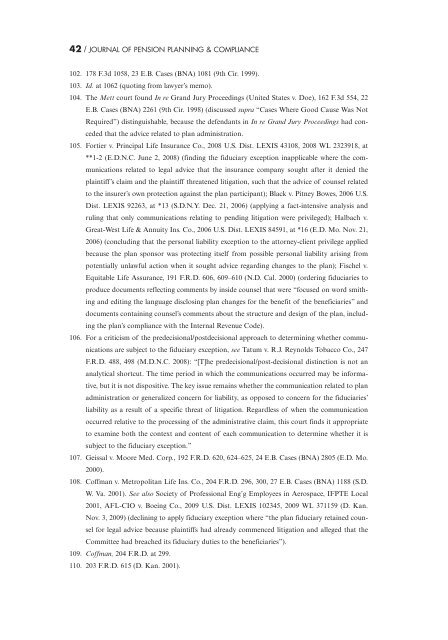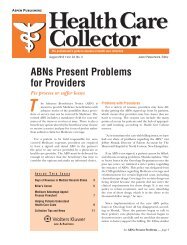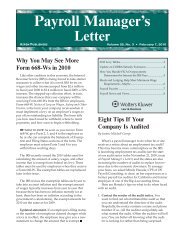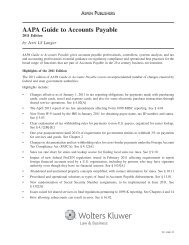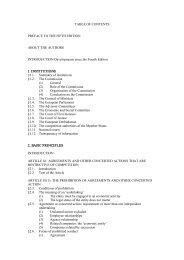journal of pension planning & compliance - Kluwer Law International
journal of pension planning & compliance - Kluwer Law International
journal of pension planning & compliance - Kluwer Law International
Create successful ePaper yourself
Turn your PDF publications into a flip-book with our unique Google optimized e-Paper software.
42 / JOURNAL OF PENSION PLANNING & COMPLIANCE<br />
102. 178 F.3d 1058, 23 E.B. Cases (BNA) 1081 (9th Cir. 1999).<br />
103. Id. at 1062 (quoting from lawyer’s memo).<br />
104. The Mett court found In re Grand Jury Proceedings (United States v. Doe), 162 F.3d 554, 22<br />
E.B. Cases (BNA) 2261 (9th Cir. 1998) (discussed supra “Cases Where Good Cause Was Not<br />
Required”) distinguishable, because the defendants in In re Grand Jury Proceedings had conceded<br />
that the advice related to plan administration.<br />
105. Fortier v. Principal Life Insurance Co., 2008 U.S. Dist. LEXIS 43108, 2008 WL 2323918, at<br />
**1-2 (E.D.N.C. June 2, 2008) (finding the fiduciary exception inapplicable where the communications<br />
related to legal advice that the insurance company sought after it denied the<br />
plaintiff’s claim and the plaintiff threatened litigation, such that the advice <strong>of</strong> counsel related<br />
to the insurer’s own protection against the plan participant); Black v. Pitney Bowes, 2006 U.S.<br />
Dist. LEXIS 92263, at *13 (S.D.N.Y. Dec. 21, 2006) (applying a fact-intensive analysis and<br />
ruling that only communications relating to pending litigation were privileged); Halbach v.<br />
Great-West Life & Annuity Ins. Co., 2006 U.S. Dist. LEXIS 84591, at *16 (E.D. Mo. Nov. 21,<br />
2006) (concluding that the personal liability exception to the attorney-client privilege applied<br />
because the plan sponsor was protecting itself from possible personal liability arising from<br />
potentially unlawful action when it sought advice regarding changes to the plan); Fischel v.<br />
Equitable Life Assurance, 191 F.R.D. 606, 609–610 (N.D. Cal. 2000) (ordering fiduciaries to<br />
produce documents reflecting comments by inside counsel that were “focused on word smithing<br />
and editing the language disclosing plan changes for the benefit <strong>of</strong> the beneficiaries” and<br />
documents containing counsel’s comments about the structure and design <strong>of</strong> the plan, including<br />
the plan’s <strong>compliance</strong> with the Internal Revenue Code).<br />
106. For a criticism <strong>of</strong> the predecisional/postdecisional approach to determining whether communications<br />
are subject to the fiduciary exception, see Tatum v. R.J. Reynolds Tobacco Co., 247<br />
F.R.D. 488, 498 (M.D.N.C. 2008): “[T]he predecisional/post-decisional distinction is not an<br />
analytical shortcut. The time period in which the communications occurred may be informative,<br />
but it is not dispositive. The key issue remains whether the communication related to plan<br />
administration or generalized concern for liability, as opposed to concern for the fiduciaries’<br />
liability as a result <strong>of</strong> a specific threat <strong>of</strong> litigation. Regardless <strong>of</strong> when the communication<br />
occurred relative to the processing <strong>of</strong> the administrative claim, this court finds it appropriate<br />
to examine both the context and content <strong>of</strong> each communication to determine whether it is<br />
subject to the fiduciary exception.”<br />
107. Geissal v. Moore Med. Corp., 192 F.R.D. 620, 624–625, 24 E.B. Cases (BNA) 2805 (E.D. Mo.<br />
2000).<br />
108. C<strong>of</strong>fman v. Metropolitan Life Ins. Co., 204 F.R.D. 296, 300, 27 E.B. Cases (BNA) 1188 (S.D.<br />
W. Va. 2001). See also Society <strong>of</strong> Pr<strong>of</strong>essional Eng’g Employees in Aerospace, IFPTE Local<br />
2001, AFL-CIO v. Boeing Co., 2009 U.S. Dist. LEXIS 102345, 2009 WL 371159 (D. Kan.<br />
Nov. 3, 2009) (declining to apply fiduciary exception where “the plan fiduciary retained counsel<br />
for legal advice because plaintiffs had already commenced litigation and alleged that the<br />
Committee had breached its fiduciary duties to the beneficiaries”).<br />
109. C<strong>of</strong>fman, 204 F.R.D. at 299.<br />
110. 203 F.R.D. 615 (D. Kan. 2001).


